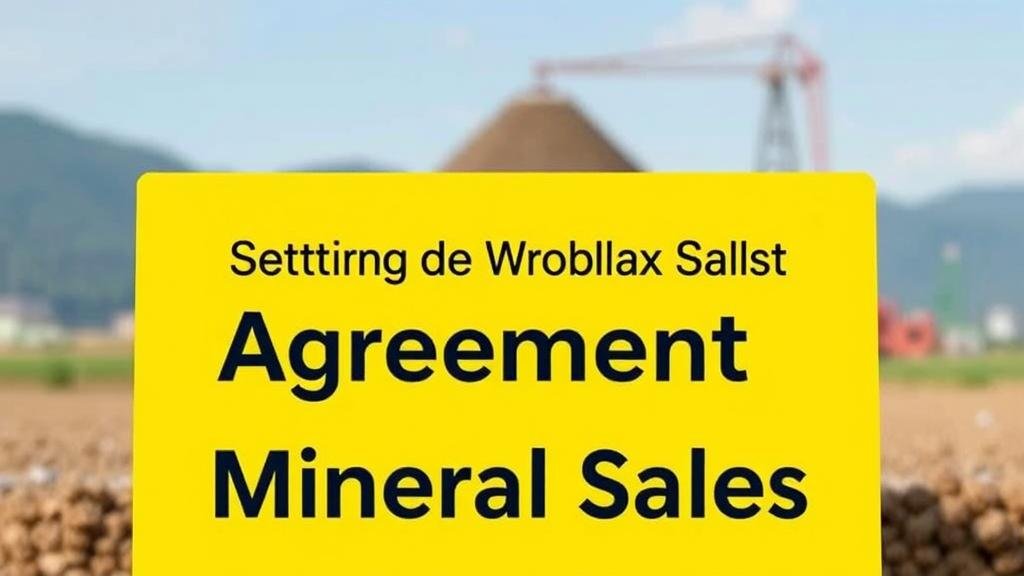Setting Up Wholesale Agreements for Regular Mineral Sales
Setting Up Wholesale Agreements for Regular Mineral Sales
Setting up wholesale agreements for regular mineral sales requires careful planning and a comprehensive understanding of both the minerals market and legal frameworks. This article explores the key components of creating effective wholesale agreements, discusses potential challenges, and provides actionable insights for businesses seeking to enter this sector.
Understanding Wholesale Agreements
A wholesale agreement is a legally binding contract between a supplier and a buyer, outlining the terms under which minerals are sold in bulk. These agreements typically detail pricing, quantity, delivery schedules, and payment terms. Understanding this framework is essential for mitigating risks and ensuring mutual benefit.
Key Components of Wholesale Agreements
When crafting wholesale agreements, several critical components must be addressed to ensure clarity and enforceability:
- Product Specification: Clearly define the minerals being sold, including type, quality, and any specifications or certifications required.
- Pricing Structure: Establish a pricing model, such as fixed pricing, variable pricing based on market conditions, or discounts for volume purchases.
- Delivery Terms: Specify the delivery schedule, logistics, and responsibilities for both parties in terms of shipping and handling.
- Payment Terms: Outline the payment methods accepted, timelines for payment, and consequences for late payments.
- Duration of Agreement: State the duration of the contract and conditions for renewal or termination.
- Confidentiality Clauses: Include confidentiality clauses to protect sensitive business information exchanged during the agreement.
Legal Considerations
In navigating the legal landscape, businesses must ensure compliance with both local and international laws governing mineral sales. This includes:
- Mineral Rights: Verify that the seller has legal rights to sell the minerals in question.
- Regulatory Compliance: Adhere to regulations set forth by governing bodies such as the Environmental Protection Agency (EPA) and the Mine Safety and Health Administration (MSHA).
- Dispute Resolution: Include provisions for addressing disputes, such as mediation or arbitration, which can save time and resources compared to litigation.
Market Analysis for Pricing
Before finalizing wholesale agreements, conducting a market analysis is essential. This involves assessing current market trends, competitor pricing, and customer demand. For example, the price of copper fluctuates regularly based on supply chain dynamics and global demand. According to a report by the International Copper Study Group, global copper production is expected to reach approximately 25 million metric tons by 2025. Understanding these trends allows businesses to set competitive pricing and make informed forecasts about sales volumes.
Case Study: A Successful Mineral Wholesaler
One notable example of effective wholesale agreements is found in the operations of XYZ Mining Corp, a company specializing in bulk mineral sales. After careful negotiations, they established agreements with several manufacturers in the construction industry. Key strategies included:
- Offering volume discounts to encourage larger purchases.
- Useing a flexible delivery schedule to adapt to clients changing demands.
- Maintaining transparent communication regarding market price fluctuations.
As a result, XYZ Mining Corp increased sales by 40% in the first year of implementing these agreements, showcasing the benefits of strategic planning and market awareness.
Common Challenges and Solutions
Businesses may face several challenges when establishing wholesale agreements, such as:
- Market Volatility: Fluctuations in mineral prices can threaten profitability. To mitigate this, consider incorporating price adjustment clauses based on market metrics.
- Supply Chain Disruptions: Unexpected disruptions can affect delivery schedules. Useing a robust logistics plan and clear communication pathways can help manage these risks.
Actionable Takeaways
In concluding this examination of wholesale agreements for regular mineral sales, businesses should:
- Thoroughly research the minerals market to set reasonable expectations for pricing and demand.
- Engage legal counsel to review agreements, ensuring compliance with relevant laws.
- Maintain open communication with all stakeholders to foster trust and adaptability.
- Regularly revisit and renegotiate agreements to reflect changing market conditions.
Setting up wholesale agreements in the mineral sector presents both opportunities and challenges. By focusing on essential components, legal considerations, and market intelligence, businesses can navigate this complex landscape successfully.



